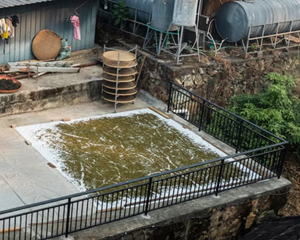Despite his family's owning thousands of venerable tea trees, Ai lived in poverty during his childhood because demand for their product was nonexistent.
尽管艾荣一家拥有数千棵珍贵的老茶树,他小时候却很贫穷,因为他们家的茶叶无人问津。
During the second half of the 20th century, China's focus on mass production from high-yield, large terrace plantations left little room for the old trees' labor-intensive harvests.
20世纪下半叶,中国把重点放在大型高产率梯田茶园的大量生产上,因此劳动密集型的老树收成没有什么发展空间。
While growers across other Yunnan tea mountains razed their ancient groves to plant younger, more productive trees, the people of Jingmai remained steadfast in protecting their arboreal treasure.
云南其他茶山的茶农都将古茶树丛砍光,改种较年轻、产量较高的茶树,但景迈山的居民仍然坚定守护着他们的珍贵茶树。
Their commitment was reinforced by practical constraints: Without modern roads, their old trees were ill-suited for mass production.
现实条件的限制也巩固了他们保护古树的决心:由于缺乏现代道路,他们的古树并不适合大量生产。
The Indigenous communities persevered with their seemingly unkempt forests.
这些居民就守着他们看似杂乱的树林坚持了下去。
Jingmai's fortunes changed around 2000, when the Chinese government invested in new roads and electricity for rural areas.
景迈山的命运在2000年左右发生转变,当时中国政府为农村地区投资新的道路及电力建设。
Slowly, new tea buyers began to arrive at the mountain, even as increased access led to more challenges.
慢慢有新的茶叶买家抵达山区,但同时交通便利也带来了更多的挑战。
Some villagers destroyed parts of the forests to harvest timber for new construction; others applied harmful chemicals to their trees and pruned aggressively to boost profits.
有些村民为了取得盖房子用的木材而破坏部分森林;有些人则在自己的树上使用有害化学物质,并大力修剪茶树以提高利润。

By 2003, Su Guowen, a retired primary school teacher who claims to be a descendant of Pa Aileng, felt the need to act.
到了2003年,一位自称是帕哎冷后代的退休小学老师苏国文觉得必须采取行动了。
At community meetings he invoked Pa's purported instruction to protect the forests "like your own eyes," arguing that the continued preservation of ancient practices and traditions would bring growers long-term benefits, even if they had to sacrifice short-term yield.
在社区会议上,他提到传说中帕哎冷的指示,要“像保护你自己的眼睛”那样保护茶林,他主张,继续维持古老的做法与传统,会为茶农带来长远的好处,即使必须牺牲短期利益。
Village chief Ai Sen also rallied the Dai people to protect their crafted biospheres. Both pushed for bans on clear-cutting and chemical use.
村长艾森也号召傣族人来保护他们精心打造的生物圈。两人都推动禁止森林皆伐与使用化学物质。
Around 2010, that movement gained more speed when village elders joined forces with the Chinese government to petition for World Heritage status.
2010年左右,村中长老与中国政府合作,申请将景迈山列为世界遗产,这场运动也因此加速。
As part of the government's push, authorities put a checkpoint on the single road leading up Jingmai Mountain to stop people from bringing in non-native plants and animal species,
在政府的推行方面,当局在通往景迈山的唯一道路上设置检查哨,阻止民众带进外来的植物与动物,
built a road using stones rather than asphalt, which might disrupt the aromas of the tea, and formally restricted construction and deforestation in the area.
还修了一条用石子而不是柏油铺成的道路,以防破坏茶叶的香气,并且明文禁止在这个地区进行营造与毁林。
Zuo Jing, a professor at Anhui University, joined the effort to help document the area's distinct cultural heritage.
安徽大学教授左靖也协助记录这个地区独特的文化遗产。
His government-funded team also built eco-friendly model homes to demonstrate how some modern technologies vastly improve sanitation, heating, and power while preserving the ancient architecture, something the community quickly adopted.
在政府的资助下,他的团队也建造了环保示范屋,展示某些现代科技如何大幅改善卫生、供热与供电问题,同时还能保存古老的建筑,而当地社区很快就采用了这样的做法。
"Jingmai Mountain is like an old tea tree that has both a unique history and a powerful contemporary life force that continues to grow," he says.
“景迈山就像是一棵古茶树,既有独特的历史。也有在现代持续成长的强大生命力”,他说。













